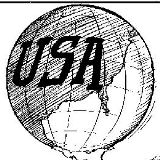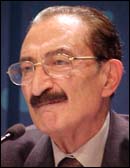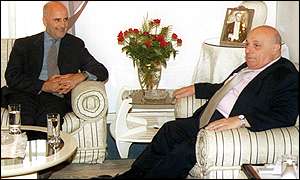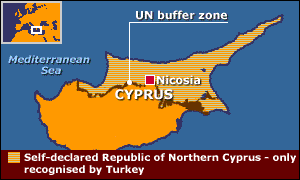28
August 2002
![]()
2. "Turk PM Calls for Unity on Left, but Not for All", Prime Minister Bulent Ecevit urged Turkish leftists to rally around him on Wednesday, but his appeal was laced with the bitterness dividing mainstream parties that may deliver power to a party accused of Islamist leanings.
3. "The Turkish Cypriot leader admits that he wants to split the Republic of Cyprus", Ankara Anatolia News Agency (26.08.02) reported from occupied Nicosia that the Turkish Cypriot leader, Mr Rauf Denktas, responded to Cyprus Foreign Minister, Mr Ioannis Kasoulides, who recently said that the Greek Cypriot side would not accept a solution that would split up the Cyprus Republic. "This is the wall we face at the talks", Denktas remarked.
4. "Danish politician against Muslim Turkey's membership in EU", the deputy leader of Danish People's Party, the main supporter of the Liberal-Conservative coalition in Denmark parliament, Peter Skaarup, is against Turkey's membership in the EU because the country is predominantly Muslim, Danish news agency Ritzau said on Tuesday.
5. "Cyprus deadlines", efforts to end the decades-old divide on Cyprus are reaching a critical stage with the European Union due to consider the island's membership bid by the year-end.
6. "Intimidation to voters", a statement by HADEP Sirnak Provincial Organisation pointed out that mukhtars and important people in Ziristin (Besta Beleka), Ucagac, Yolagzi, Yeni Koy (Xirabresik), Dedeler (Babga), Yazi (Semga), Uyanik (Xinis), Basak (Zedga) and Esenler (Germge) were called to Silopi Teachers' Community House by Silopi kaimakam and gendarme commander on August 20 and there threatened.
1. - DPA - "Turkey suspicious of US policy on Iraq: Kurdish resurgence":
ISTANBUL / 28 August 2002 / by Ingo Bierschwale
Against the background of a possible United States military operation
in Iraq to unseat Saddam Hussein, tensions between Turkey and the Kurds
of northern Iraq are rising - and taking on a martial tone.
Relations between the two sides have degraded to the point where Iraqi Kurdish leader Massud Barsani, in response to Turkish "provocations", warned that "a grave" would be prepared for the Turkish army if it dared intervene in northern Iraq.
What is behind all the saber rattling?
US President George W. Bush's extensive efforts to include the Kurdish opposition in his plans to topple Iraq strongman Saddam Hussein have raised Turkish suspicions.
The idea of a change of regime in Iraq would find full support with Turkey's government and military, but only on condition that the creation of a Kurdish state be avoided at all costs.
After successfully overpowering the Kurdish Workers' Party (PKK) that for 15 years has sought to set up an autonomous Kurdish region in Turkey's southeast, Ankara is has no interest in seeing the unrest that could accompany the birth of a Kurdish state just across the border.
Despite its misgivings that military invention in Iraq would destabilize the region, Turkey has given the appearance of accepting a US attack.
"We are making political and military preparations," was the latest statement on the matter from Prime Minister Bulent Ecevit, who could not have ignored the financial benefits of a "strategic partnership" with the United States for his crisis-ridden country.
The first signs of Turkey's lack of trust for Iraqi Kurds appeared when Bush invited northern Iraqi opposition groups to Washington.
The Turkish army, as it pursued PKK fighters in Iraq, had made attempts to reach out to the Democratic Party of Kurdistan which Barsani led. When it came however to the Washington meeting, Barsani was forced to send a deputy because, as Turkish media reported, Turkish authorities confiscated his diplomatic passport.
At the heart of the matter, is Ankara's difficulty in swallowing Barsani's assertion that the Kurds of north Iraq have no plans of creating their own state.
This disbelief is strengthened by Turkish media reports that the two main Kurdish groups - Barsani's group and the Patriotic Union of Kurdistan led by Jalal Talabani, who have shared power in northern Iraq since the 1991 Gulf War - have recently agreed to further consolidate Kurdish national structures.
The last straw was the discovery of a map of northern Iraq that Turkish media attributed to Barsani, in which the city of Mosul was identified as "Kurdish".
Turkish nationalists were immediately reminded of the disintegration of the (Turkish) Ottoman Empire at the beginning of the 20th century.
"(The area around the cities of) Mosul and Kirkuk is a Turkmen area. That anyone has their eye on this region is intolerable," thundered Sabahattin Cakmakoglu, Turkish defence minister and member of the right-wing National Action Party (MHP).
According to the Turkish Daily News, there are three million Turkmen - ethnic Turks - in Iraq. Of that number, 400,000 live in the region around Mosul, which was already a subject of dispute at the end of the Ottoman Empire - not least due to the presence of oil there.
It was only under British pressure that Turkey relented
and ceded the territory in 1926 - to Iraq. ![]()
2. - Reuters - "Turk PM Calls for Unity on Left, but Not for All":
ANKARA / 28 August 2002 / by Hidir Goktas
Prime Minister Bulent Ecevit urged Turkish leftists to rally around
him on Wednesday, but his appeal was laced with the bitterness dividing
mainstream parties that may deliver power to a party accused of Islamist
leanings.
The veteran prime minister, his Democratic Left Party (DSP) reeling from the defection of half its members, made clear his call did not apply to all.
"Dubious leftists," he said, had no place in an alliance for November 3 polls.
Ecevit's Foreign Minister Ismail Cem deserted him at the height of a government crisis this summer and founded the New Turkey Party.
Kemal Dervis, a former World Banker brought back to Turkey by Ecevit in 2001 to deal with a devastating financial crisis, resigned as economy minister and joined his fate to Ecevit's archrivals in the Republican People's Party (CHP).
"This is not a call for all those on the left," Ecevit said, adding his invitation applied to those on the "democratic left."
Ideological differences between the various parties on the left and center-left in Turkey are often hard to spot. The defining element of most parties is traditionally the leader.
Ecevit, 77, identified none of his rivals by name.
Markets, generally flat on Wednesday, have been closely following the efforts of Dervis, architect of a multi-billion dollar IMF crisis plan, to build a unified center-left platform. He resigned as economy minister this month after an angry Ecevit told him to remain loyal to the government or pack his bags.
OPINION POLLS GIVE AKP THE LEAD
Opinion polls currently give the lead to the Justice and Development Party (AKP), formed last year after the banning of an Islamist party which then splintered into two groups. Moderates joined the AKP, which now describes itself as conservative democratic and rejects the Islamist label.
It says it backs Turkey's drive for European Union (EU) membership, vital to attracting much needed foreign investment, and promotes free market economics.
Nevertheless, AKP is still something of an unknown quantity and markets are not certain how it would deal with Turkey's $16 billion International Monetary Fund program. Some also remember the fate of the last Islamist-led government which was forced from power in 1997 by an army-led campaign.
Dervis has said he would like Ecevit to ally with the CHP, but Ecevit struck no note of reconciliation on Wednesday.
He talked of "certain circles" conspiring to bring down the DSP and his government.
"I am calling all national leftists and those who have arrived at an understanding of the democratic left to unite under the DSP," Ecevit said in a carefully worded statement.
Markets fear that many of the mainstream parties may fail to reach the 10 percent threshold need to win seats in parliament at the November 3 election, which was called early after Ecevit fell ill and his three-party coalition stumbled over Turkey's EU ambitions.
Ecevit also said he thought it would be difficult in practical terms for the election to be delayed. Rumors abound in Ankara that parties fearing electoral defeat may conspire to put off the polls. He said elections were now "inescapable."
ARMED FORCES OPPOSE VOTE DELAY
The head of Turkey's powerful armed forces, which often lends a guiding hand in the country's tumultuous political life, said on Tuesday that delaying the election could plunge Turkey into chaos. Ecevit said that while he had initially opposed bringing the election forward from April 2004, it was now too late for parliament to take the steps needed to put it off.
The DSP numbers among the parties that could well fail to win parliamentary seats in November.
Ecevit, five times prime minister in a career spanning
five decades, predicted his party would come first in the elections
-- an outcome that would confound opinion polls which give the DSP little
chance of reaching 10 percent. ![]()
3. - Cyprus PIO - "The Turkish Cypriot leader admits that he wants to split the Republic of Cyprus":
27 August 2002
Ankara Anatolia News Agency (26.08.02) reported from occupied Nicosia
that the Turkish Cypriot leader, Mr Rauf Denktas, responded to Cyprus
Foreign Minister, Mr Ioannis Kasoulides, who recently said that the
Greek Cypriot side would not accept a solution that would split up the
Cyprus Republic. "This is the wall we face at the talks",
Denktas remarked.
The Turkish Cypriot leader said that the Greek Cypriots cannot reach anywhere by calling themselves the ``Cyprus Republic`` and by trying to possess the whole island with this name. ``What they call the Cyprus Republic has its borders at Ledra Palace and it doesn`t go any further. We are not in this republic and we haven`t been in this republic for 39 years. Turkish Cypriots had to found their own state,`` he explained.
Denktas alleged that there were two republics, two sovereign states and two separate administrations and two democracies in Cyprus. He added that Kasoulides was trying to drag the Turkish Cypriots behind himself by saying ``it is us who are recognized by the EU`` and then sentence them to an unhappy fate. He said the Turkish Cypriots would not be deceived by this.
``Our priority is an agreement and the basis of this agreement should be the existence of two sovereign administrations,`` Denktas said. ``The EU should admit this fact and contact us directly. It should cooperate with us and help us to elevate our economy to the level of the Greek Cypriots` economy, and it should not make us subject to Greek Cypriot republic`` he commented.
Denktas further alleged that Mr Kasoulides made this remark to influence the meeting he will have with U.N. Secretary-General in Paris on September 6. He added that he believed the U.N. Secretary-General would not fall into this trap.
Replying to questions regarding the news that appeared
in the Greek Cypriot press that Belgian and Swiss experts headed by
Lord David Hannay, Britain`s special envoy to Cyprus, were working on
a new constitution, Denktas said what is important is whether any work
on a constitution for Cyprus acknowledges the sovereignty right of Turkish
Cypriots or not. ``If it does not, we can reach nowhere.This community
does not make an agreement on a new paper and put its future on a thin
ice. This should be known by everybody,`` he concluded. ![]()
4. - IRNA - "Danish politician against Muslim Turkey's membership in EU":
BRUSSELS / 27 August 2002
The deputy leader of Danish People's Party, the main supporter of
the Liberal-Conservative coalition in Denmark parliament, Peter Skaarup,
is against Turkey's membership in the EU because the country is predominantly
Muslim, Danish news agency Ritzau said on Tuesday.
Turkey has been exerting pressure on the Danish government, the current holder of the EU presidency, to open talks with it over EU membership prior to the EU summit in Copenhagen in December.
But the EU is reluctant to do this, saying that Turkey is not ready to join the 15-nation bloc for political and economic reasons, said the agency.
Now the Danish People's Party, is calling on the government clearly to state its position on the Turkish question. Peter Skaarup has demanded a written answer in the parliament from Prime Minister Anders Fogh Rasmussen on whether the government is for or against Turkey's membership in the EU.
Skaarup also wants a report from Employment Minister Claus Hjort Frederiksen outlining what consequences the accession of Turkey's 65 million citizens to the EU would have for the European job market.
Skaarup, who fears that Turkey would destabilise the EU
politically and economically, said that both Turks and Danes have the
right to a clear answer. ![]()
5. - Financial Times - "Cyprus deadlines":
28 August 2002
Efforts to end the decades-old divide on Cyprus are reaching a critical
stage with the European Union due to consider the island's membership
bid by the year-end.
The EU hopes the prospect of accession will concentrate the minds of Greek and Turkish Cypriots. But as Glafcos Clerides, the Greek Cypriot leader, said this week, 2002 had seen no progress.
The islanders must grasp this opportunity for a permanent settlement. And the EU must apply maximum pressure in Cyprus itself, and in Greece and Turkey.
The EU has agreed as a possible last resort to admit Cyprus with or without a settlement. But without a deal, the stability of the region could be in jeopardy.
Mr Clerides, who is 83, and Rauf Denktash, his 79-year-old Turkish Cypriot counterpart, have a historic chance to secure the island's future. The outline of a likely settlement is clear - one federal state with a high level of autonomy for the two communities.
But the devil is in the detail, including sensitive issues such as the extent of rights of dispossessed Greek Cypriots to reclaim lost homes.
Support for a compromise seems to have grown on the island this year. Greek Cypriots have long wanted a deal that would lead to EU membership. Turkish Cypriots, who number just 150,000 (with mainland settlers) against 640,000 Greek Cypriots, are beginning to see that an EU-linked deal could be a last chance to enshrine their claims to political equality.
Some Turkish Cypriots also fear that without a deal, their small community will be hit by emigration.
However, Mr Denktash and his backers in Ankara remain very suspicious of Mr Clerides and his Greek supporters. Turkey, with 30,000 troops on the island, has hinted that it might accept a deal if Brussels responded more positively to its own EU membership bid and set dates for starting negotiations.
With Turkish politics in turmoil and a general election due in November, politicians in Ankara are unlikely to say anything now that smacks of "giving away" Cyprus. The EU must press for an early post-election initiative from Ankara, pointing out that however long the road to Turkish membership of the EU it will be even longer if Cyprus remains divided.
Brussels should also apply pressure on Greece to adopt a more conciliatory approach to Turkey. If relations between Ankara and Athens were generally less hostile, the Cypriots would find a deal easier to achieve.
As an EU and Nato member, Greece should not shirk its
responsibilities. ![]()
6. - Kurdish Observer - "Intimidation to voters":
24 August 2002
A statement by HADEP Sirnak Provincial Organisation pointed out that mukhtars and important people in Ziristin (Besta Beleka), Ucagac, Yolagzi, Yeni Koy (Xirabresik), Dedeler (Babga), Yazi (Semga), Uyanik (Xinis), Basak (Zedga) and Esenler (Germge) were called to Silopi Teachers' Community House by Silopi kaimakam and gendarme commander on August 20 and there threatened. Giving a talk to migrant-villagers whose villages were depopulated between 1992 and 1995, the kaimakam and gendarme commander were reported to threaten them to go to their villages a day before the elections and to vote there. The officials were said to say "You will go to your village and vote there. Otherwise those who are opposed to us cannot get any aid."
Migrants whose village in Silopi district of Sirnak province had been forcibly depopulated were threatened to go to their villages a day before the elections and vote there. And in Geçitli community of Hakkari province six villagers were detained after a delegation from HADEP village commission left.
As count-down for November 3 elections begins, repression on HADEP voters in Kurdish provinces also increases.
A statement by HADEP Sirnak Provincial Organisation pointed out that mukhtars and important people in Ziristin (Besta Beleka), Ucagac, Yolagzi, Yeni Koy (Xirabresik), Dedeler (Babga), Yazi (Semga), Uyanik (Xinis), Basak (Zedga) and Esenler (Germge) were called to Silopi Teachers' Community House by Silopi kaimakam and gendarme commander on August 20 and there threatened. Giving a talk to migrant-villagers whose villages were depopulated between 1992 and 1995, the kaimakam and gendarme commander were reported to threaten them to go to their villages a day before the elections and to vote there. The officials were said to say "You will go to your village and vote there. Otherwise those who are opposed to us cannot get any aid."
DETENTION IN HAKKARI
On the other hand, it has been reported that voters are put under repression by military forces during the activities of HADEP Hakkari Provincial Organization in villages. A village commission from HADEP Provincial Organisation met with mukhtar and some villagers in Gecitli Community on August 21 in order to determine the number of voters who did not appear in the electoral roll. The commission handed out the petitions and residence papers for electoral roll. But after the delegation left Gecitli, gendarme forces raided on the houses of some villagers and detained Ali Demir, Necmettin Demir, Ahmet Demir, Serdar Canatak, Ahmet Abi and Bahattin Abi. The detainees were released the other morning after being threatened not to support HADEP and not to take part in its activities.
"I am being abducted"
A total of 6 persons were detained without any justification in the operations in central, Silvan and Lice districts of Amed.
Anti-Terror Team policemen in Silvan made house-raids and detained Umit Simsek (20), Sidar Simsek (24) and Hasan Soker (24) the other day. Their relatives applied to the Human Rights Association (IHD) Diyarbakir Branch as they could not find whereabouts of the detainees whereas Simsek and Soker families filed a complaint against the policemen. The families asked for an urgent reply as they were worried for detainees'. And in Daralan Village of Lice two brothers Tahsin and Faruk Peker were detained without any justification as they were going from Amed to Lice. Their elder brother Ihsan Peker went to IHD Diyarbakir Branch but they could not get any information about the detainees. And in Amed centrum construction worker Osman Bozderi (36) was detained three days ago. His brother reported the detention to IHD.
On the other hand eye-witnesses in Baglar quarter of Amed
reported that a young person was forced to get in a car whose license
plate was 21 DU 806. The abducted person was reported to shout "I
am being abducted. Report to IHD". ![]()